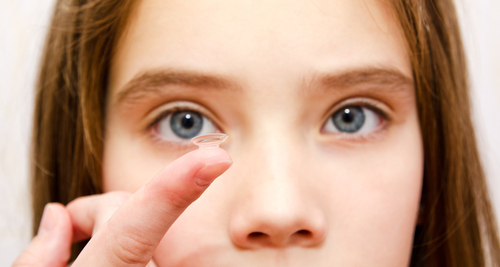
If you wear prescription glasses, you know the responsibilities. Wipe them with a soft cloth, clean them with glasses cleaner, and store them in a case to prevent damage, especially if you’re carrying them in a backpack or bag.
Most importantly, never place the lens down to avoid scratching, and don’t lose them! So, if you’re taking good care of your glasses, are you mature enough to take care of contact lenses?
Keep reading to learn if you may be mature enough to wear contact lenses!
Age is Not the Determining Factor
While children as young as eight can wear contacts, it’s maturity and not a number that determines how well you’ll do. Although your eye doctor will first want to ensure you are a good candidate for contact lenses, age is not a determining factor.
Habits, Hygiene, Rules, and Routines
Some basic things to consider: how’s your personal hygiene? Are you someone who showers or bathes regularly without being reminded?
A good indicator of someone who may be ready for contact lenses is someone who keeps their bathroom and bedroom clean and organized. Also, someone who is good at setting up routines for schoolwork and chores and following through on their own may be ready for the responsibility of contact lenses.
It is essential that you follow the rules about care, wearing, and maintenance.
Medical Device, not Fashion Accessory
Contact lenses are medical devices, not fashion accessories, and you need a prescription from an eye care professional to get them. While buying contacts without a prescription is possible, there are real risks involved.
Never wear cosmetic or decorative lenses purchased through a beauty supply store or flea market. Appropriate care for your contact lenses is essential.
Whether you wear daily lenses or monthly ones that require cleaning and sterilization, you can’t skip these procedures. If you do, you can harm your eyes and damage your sight.
Contact Lens Complications
Many children and adolescents develop contact lens-related issues every year. Common problems include eye infections and eye abrasions.
Ulcers, which occur when there is severe inflammation in the surface layer of the eye, are the most serious problems. Although uncommon, they can cause permanent vision loss if not treated quickly.
This is one reason why extended-wear contact lenses, or ones you can sleep in, are not advised for children and teens. They increase the risk of corneal ulcers.
Daily vs. Monthly Lenses
Daily disposable lenses reduce these risks but are more expensive than monthly lenses. With monthly lenses, you’ll have to clean and disinfect them, store them in a contact lens case with lens solution, and rinse them with sterile saline solution before you wear them.
Keeping the lenses and the case clean is part of the routine. Whichever lens you choose, hygiene remains essential.
Six Safety Tips for Contact Lens Wearers
Follow these ten safety tips to ensure your contact lenses are worn with minimal risks:
- Always wash your hands before inserting or removing lenses.
- Only use products recommended for your contact lenses.
- Don’t exceed the recommended length of time when wearing your lenses.
- Don’t sleep in them.
- Don’t wear anyone else’s lenses or share your own.
- If you wear makeup, your lenses are first on, first off: put your lenses in before applying makeup, and take them off before you remove makeup.
If all these guidelines sound manageable as part of your daily routine, you’re likley mature enough for contacts.
Are you ready to learn if you may be a good candidate for contact lenses? Schedule an appointment at Metro Eye Care in New Lenox, IL, today!
